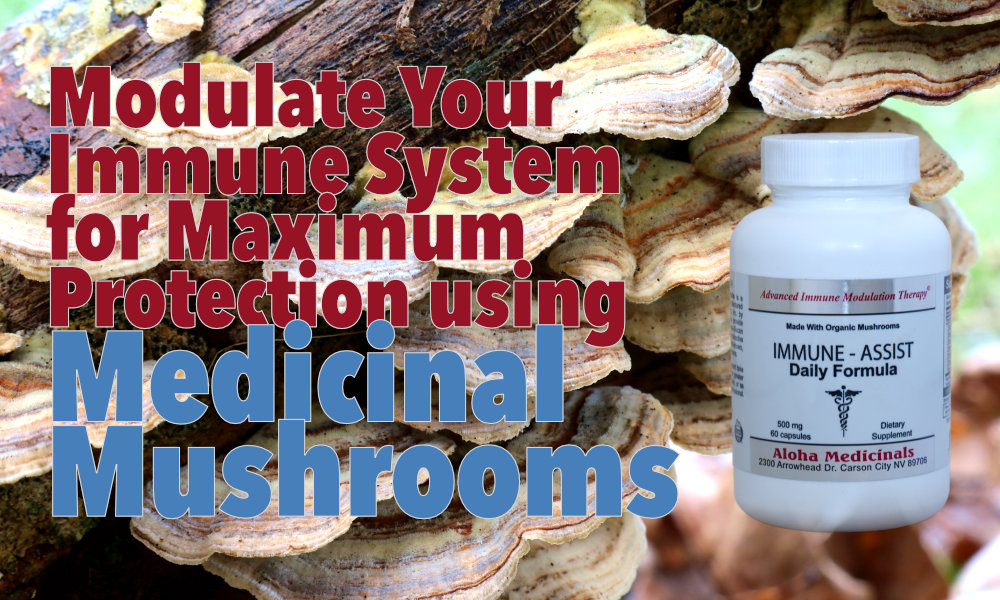Immune System, Medicinal Mushrooms
Immune Assist Daily Formula – Modulate Your Immune System for Maximum Protection using Medicinal Mushrooms
EXTRACTS OF MEDICINAL MUSHROOMS
ARE SOME OF THE MOST POWERFUL IMMUNE MODULATORS KNOWN
 Given the challenges of maintaining optimal immunity in the modern world, it is understandable that a broad sector of the population suffers from compromised immune systems.
Given the challenges of maintaining optimal immunity in the modern world, it is understandable that a broad sector of the population suffers from compromised immune systems.
My recommendations for strengthening the body under the circumstances include eating a healthy organic food diet, taking foundational supplements including a therapeutic multivitamin, essential fatty acids, a powerful vitamin C/antioxidant (provides and stimulates a combination of exogenous and endogenous protective nutrients and enzymes that trap free radicals), and a detoxifying superfood. Also, it is important to drink pure water, maintain a clean environment, and engage in healthy activities (walking, yoga, tai chi gung, and helping those in great need, etc.)
I strongly advise taking IMMUNE-ASSIST Daily Formula for the reasons I’ll discuss below. I am excited about this product because it includes a large number of polysaccharides from multiple medicinal mushrooms.
A Rich History of Medicinal Mushroom
Usage and Research
In China, Japan, Korea, and more recently in the USA, medicinal mushrooms have been studied for their capacity to modulate immune response. Extracts from most of the medicinal mushrooms show a common property of enhancing immune function through the modulation of cell-mediated immunity. Put more simply, extracts from medicinal mushroom turn on the immune system cells which promote healing. In fact, three different drugs extracted from mushrooms have been approved by the Japanese equivalent of the FDA (the Japanese Health and Welfare Ministry). These are lentinan, derived from shiitake; PSK, derived from coriolus versicolor; and schizophyllan, derived from suehirotake.

A great deal of the research into medicinal mushroom has focused on discovering compounds that modulate the biological response of immune cells in the human body. One facet of the research has demonstrated that medicinal mushrooms grown on vegetable sources (such as millet, rice bran, buckwheat, milo, etc.) enzymatically activate a process whereby complex cross-linked polysaccharides are converted to biologically active immuno-modulators. The polysaccharides produced by this process are effective immune system balancers.

Certain mushroom derived-glucans and polysaccharide-bound proteins have been shown to act as immunomodulators. These polymers interact with the immune system to up-regulate or down-regulate the responses of the host withn various therapeutic effects.
Whether certain compounds enhance or suppress immune responses can depend on a number of factors including dosage, route of administration, timing and frequency of administration, mechanism of action or the site of activity.
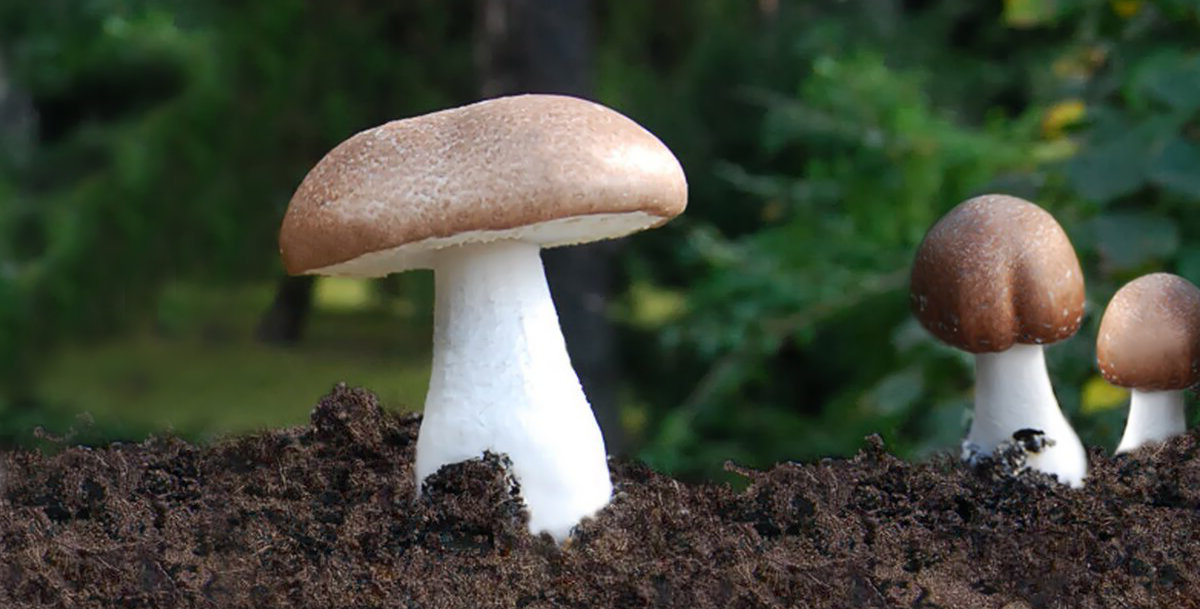
While the role of medicinal mushrooms in immunomodulation and therapeutic activities represents the central theme of much of the research, many of the medicinal mushrooms have been valued for supporting other medicinal properties regarding hypercholesterolemia, high blood pressure, diabetes, anti-viral, anti-bacterial, and antioxidant and free radical scavenging.
Medical Usage of Medicinal Mushrooms
In the 2001 report Medicinal Mushrooms: Their Therapeutic Properties and Current Medical Usage.., a wide variety of mushroom polysaccharides, including Lentinan (from L. edodes), Schizophyllan (from S. commune), PSK and PSP (from Trametes versicolor), and Grifron-D (from the Maitake mushroom G. frondosa) are described. Their properties demonstrate the criteria for biological response modifiers. Many of these mushroom-derived polymers enhance the host’s innate and acquired immune responses, activating immune cells essential for the maintenance of homeostasis.
Key innate responses that are stimulated by these mushroom derived-β-glucans or polysaccharide-protein complexes include host T-cells (such as cytotoxic macrophages, monocytes, neutrophils, natural killer cells, and dendritic cells) and chemical messengers (cytokines such as interleukins, interferon and colony stimulating factors) that trigger complement and acute phase responses. Moreover, mushroom polysaccharides or polysaccharide-protein complexes are considered as multi-cytokine inducers that are able to induce gene expression of various immunomodulatory cytokines and cytokine receptors.
In addition, acquired responses are also enlisted, where lymphocytes that govern antibody production (B cells) and cell-mediated cytotoxicity (T-cells) are stimulated. While the immune system is shrouded in tremendous complexity, our current understanding shows that it is regulated in an orchestrated dynamic manner.
Mushroom-derived polysaccharides have shown therapeutic activities in both pre-clinical models and in clinical trials. Although the mechanism of their action is still not completely clear, Lentinan, Schizophyllan, PSP, PSK and other mushroom polysaccharides appear to mediate their activity by activation or augmentation of the host’s immune system (via stimulated cytotoxic macrophages, cytotoxic T-cells and antibody-mediated cytoxicity of targeted cells), rather than direct cytotoxicity. Thus, both cell-mediated immune responses against the target T-cells initiated by macrophage-lymphocyte interactions and cytoxicity induced by antibodies to target T-cells are believed to contribute to the elimination of targeted harmful cells. Recent evidence suggests that several mushroom polysaccharides may also possess cytotoxic properties. Grifron-D from G. fondosa mushroom was reported to induce apoptosis (programmed cell death) in human cell-lines.
IMMUNE-ASSIST™ DAILY FORMULA™ Incorporates
Polysaccharide Extracts from Six Medicinal Mushrooms
A U.S.-based company (Aloha Medicinals, Inc.) formulated for Health Products Distributors IMMUNE-ASSIST DAILY FORMULA™ with the latest science in mind. This formula contains more than 200 different polysaccharides, derived from the enzymatic breakdown of complex organic plant material from six different species of medicinal mushrooms. These include Agaricus blazei, Cordyceps sinensis and Cordyceps militaris, Lentinula edodes (shiitake), Grifola frondosa (maitake), Ganoderma lucidum (Reishi), and Coriolus versicolor. The blend is derived from the mycelium, primordia, fruitbodies, and most importantly, the extracellular compounds produced throughout the entire life cycle of the organism. It contains a very broad range of immune-enhancing polysaccharides. It is these extracellular compounds (compounds that are excreted outside of the cell and into the surrounding environment) that are responsible for the main medicinal properties known from the fungal kingdom. This includes all the antibiotic properties, antiviral properties, antifungal properties and all the other ‘survival’ compounds that the fungus produces to give itself an advantage over the competing bacteria and microbes in the highly competitive environment in which it lives.
IMMUNE-ASSIST DAILY FORMULA™ MUSHROOMS
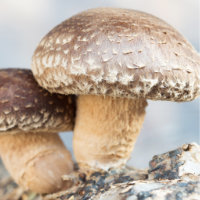 Shiitake is now the most popular and most cultivated exotic mushroom in the world. In China, shiitake has a history dating back to the Ming Dynasty (1368–1644 ACE). The mushroom was used not only as a food but was taken as a remedy for upper respiratory diseases, poor blood circulation, liver trouble, exhaustion and weakness, and to boost chi, or life energy. It was also believed to prevent premature aging. Today the shiitake is recognized for its therapeutic action and has been extensively researched in regard to its immunologic activity. The initial research was performed in 1969 by Tetsuro Ikekawa at Purdue University, along with colleagues at the National Cancer Center Research Institute in Tokyo, Japan. The researchers found that water extracts of shiitake produced high rates of dysfunctional cell inhibition in mice (72 percent to 92 percent). Ikekawa later identified a polysaccharide in shiitake called lentinan as having powerful therapeutic activity.
Shiitake is now the most popular and most cultivated exotic mushroom in the world. In China, shiitake has a history dating back to the Ming Dynasty (1368–1644 ACE). The mushroom was used not only as a food but was taken as a remedy for upper respiratory diseases, poor blood circulation, liver trouble, exhaustion and weakness, and to boost chi, or life energy. It was also believed to prevent premature aging. Today the shiitake is recognized for its therapeutic action and has been extensively researched in regard to its immunologic activity. The initial research was performed in 1969 by Tetsuro Ikekawa at Purdue University, along with colleagues at the National Cancer Center Research Institute in Tokyo, Japan. The researchers found that water extracts of shiitake produced high rates of dysfunctional cell inhibition in mice (72 percent to 92 percent). Ikekawa later identified a polysaccharide in shiitake called lentinan as having powerful therapeutic activity.
 Coriolus (or Trametes) versicolor is the most thoroughly researched mushroom. An extract of Coriolus versicolor known as PSK is sold in Europe and Japan. In addition to possessing many different therapeutic properties, it is also an immunostimulant; demonstrates anti-viral activity; enhances T-cell proliferation; and has been shown to improve both disease-free and survival rates in patients. In an eight-year clinical test of patients with breast issues, and in another 5-year study, it was shown that the polysaccharide compounds contained within Coriolus versicolor work particularly well as an adjuvant for breast therapies, exhibiting diverse biological activities.
Coriolus (or Trametes) versicolor is the most thoroughly researched mushroom. An extract of Coriolus versicolor known as PSK is sold in Europe and Japan. In addition to possessing many different therapeutic properties, it is also an immunostimulant; demonstrates anti-viral activity; enhances T-cell proliferation; and has been shown to improve both disease-free and survival rates in patients. In an eight-year clinical test of patients with breast issues, and in another 5-year study, it was shown that the polysaccharide compounds contained within Coriolus versicolor work particularly well as an adjuvant for breast therapies, exhibiting diverse biological activities.
 Maitake may be even more potent than any of the other mushrooms previously studied. This legendary giant mushroom has been studied for its therapeutic, anti-diabetic, anti-hypertensive, and anti-hyperlipemic effects since the mid-1980s. Its anti-viral activity in vitro was demonstrated in tests conducted by the Japan Institute of Health and the US National Cancer Institute in early 1992. Among various extracts obtained from the Maitake mushroom, a specific extracted fraction named Maitake D-fraction is the active constituent. This extract contains beta-1, 3-glucans and beta-1, 6-glucans protein-bound polysaccharides. It has demonstrated remarkable therapeutic activity by activating the immune system through oral administration.
Maitake may be even more potent than any of the other mushrooms previously studied. This legendary giant mushroom has been studied for its therapeutic, anti-diabetic, anti-hypertensive, and anti-hyperlipemic effects since the mid-1980s. Its anti-viral activity in vitro was demonstrated in tests conducted by the Japan Institute of Health and the US National Cancer Institute in early 1992. Among various extracts obtained from the Maitake mushroom, a specific extracted fraction named Maitake D-fraction is the active constituent. This extract contains beta-1, 3-glucans and beta-1, 6-glucans protein-bound polysaccharides. It has demonstrated remarkable therapeutic activity by activating the immune system through oral administration.
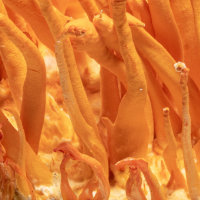 The Chinese have long used Cordyceps sinensis and Cordyceps militaris to promote overall good health, and modern research indicates that it does indeed support liver, kidney, heart, and immune system function. Cordyceps has been used to protect the bone marrow and digestive systems of mice from whole body irradiation. One experiment noted that Cordyceps may protect the liver from damage. An experiment with mice indicated the mushroom may have an anti-depressant effect.
The Chinese have long used Cordyceps sinensis and Cordyceps militaris to promote overall good health, and modern research indicates that it does indeed support liver, kidney, heart, and immune system function. Cordyceps has been used to protect the bone marrow and digestive systems of mice from whole body irradiation. One experiment noted that Cordyceps may protect the liver from damage. An experiment with mice indicated the mushroom may have an anti-depressant effect.
Researchers have observed that Cordyceps has a hypoglycemic effect and may be beneficial for people with insulin resistance. Cordyceps mushroom extracts have been shown to stimulate the number of T helper cells, prolong the survival of lymphocytes, enhance TNF-alpha and interleukin 1 production, and increase the activity of natural killer cells. One study indicates that cordyceps can stimulate progesterone production in animal cells. Another study has shown that Cordyceps may be effective against dysfunctional cells by down-regulating MHC class II antigen expression. In addition, historical use data suggests that Cordyceps can cause a reduction of cyclosporin and aminoglycoside-induced renal toxicity.
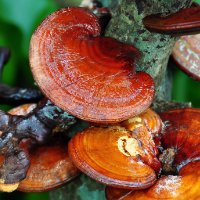 Reishi possesses immunomodulary and immunotherapeutic activities, supported by studies on polysaccharides, terpene, and other bioactive compounds isolated from fruiting bodies and mycelia of this fungus. It has also been found to inhibit platelet aggregation, and to lower blood pressure (via inhibition of angiotensin-converting enzyme), cholesterol and blood sugar. Laboratory studies have shown anti-neoplastic effects of fungal extracts or isolated compounds against some types of cell dysfunction.
Reishi possesses immunomodulary and immunotherapeutic activities, supported by studies on polysaccharides, terpene, and other bioactive compounds isolated from fruiting bodies and mycelia of this fungus. It has also been found to inhibit platelet aggregation, and to lower blood pressure (via inhibition of angiotensin-converting enzyme), cholesterol and blood sugar. Laboratory studies have shown anti-neoplastic effects of fungal extracts or isolated compounds against some types of cell dysfunction.
Reishi has been reported to block metastasis, with potency comparable to Lentinan from shiitake mushrooms. The mechanisms by which Reishi may target different stages of dysfunctional cell development include: 1) inhibition of angiogenesis (formation of new, cell-induced blood vessels created to supply nutrients to the dysfunctional cell) mediated by cytokines, 2) cytotoxicity, 3) inhibition of migration of the cells and metastasis, and 4) inducing and enhancing apoptosis of diseased cells. Besides effects on mammalian physiology, Reishiis reported to have anti-bacterial and anti-viral activities. Reishi is reported to exhibit direct anti-viral effects with the following viruses: HSV-1, HSV-2, and influenza.
 Agaricus blazei is an edible mushroom native to Brazil and cultivated in Japan and the USA for its medicinal uses. It has been used to treat arteriosclerosis, hepatitis, hyperlipidemia, diabetes, dermatitis, and tumors. In vitro experiments and studies done in mice have shown that Agaricus has immunomodulatory, therapeutic, and antimutagenic properties. The polysaccharides and anti-angiogenic compounds present in Agaricus are thought to be responsible for its therapeutic properties. Such effects are believed to be exerted by immunopotentiation or direct inhibition of angiogenesis. A recent randomized study showed that oral administration of Agaricus extract improved the natural killer cell activity and quality of life in gynecological patients undergoing chemical therapy. Agaricus was also shown to have antidiabetic effects in vitro and in animal studies. In addition, results from a study done in human subjects with type 2 diabetes suggest benefits of Agaricus extract in improving insulin resistance, and a pilot study indicates that Agaricus extract may reduce weight, BMI, body fat, and serum glucose and cholesterol levels in healthy individuals.
Agaricus blazei is an edible mushroom native to Brazil and cultivated in Japan and the USA for its medicinal uses. It has been used to treat arteriosclerosis, hepatitis, hyperlipidemia, diabetes, dermatitis, and tumors. In vitro experiments and studies done in mice have shown that Agaricus has immunomodulatory, therapeutic, and antimutagenic properties. The polysaccharides and anti-angiogenic compounds present in Agaricus are thought to be responsible for its therapeutic properties. Such effects are believed to be exerted by immunopotentiation or direct inhibition of angiogenesis. A recent randomized study showed that oral administration of Agaricus extract improved the natural killer cell activity and quality of life in gynecological patients undergoing chemical therapy. Agaricus was also shown to have antidiabetic effects in vitro and in animal studies. In addition, results from a study done in human subjects with type 2 diabetes suggest benefits of Agaricus extract in improving insulin resistance, and a pilot study indicates that Agaricus extract may reduce weight, BMI, body fat, and serum glucose and cholesterol levels in healthy individuals.
ACTIVE HEMICELLULOSE CORRELATED COMPOUND (AHCC)
AS A COMPONENT OF IMMUNE-ASSIST™ DAILY FORMULA
AHCC is produced by from the enzymatic action of vegetable sources with mycelial extracts from several different mushrooms. There is about four times more AHCC in each dose of Immune-Assist Daily Formula™ than there is in other AHCC products on the market. AHCC is a food substance that contains a broad range of polysaccharides. It is believed that a special polysaccharide with a molecular weight of about 5,000 and an alpha 1,4 glucan linkage in this mushroom extract is primarily responsible for the powerful immune enhancing effects on natural killer cells. A heavier polysaccharide in the extract appears to have a powerful stimulating effect on macrophages which, in turn, further stimulates the immune system including a number of cytokines (Interleukin-2, Interleukin-12, Tumor Necrosis Factor [TNF], and Interferon). Furthermore, some research has indicated that components of AHCC may have direct cytotoxic effects on dysfunctional cells and prevent spreading from occurring.
NATURAL KILLER CELLS
The human immune system is comprised of more than 130 subsets of white blood cells. Natural Killer (NK) cells make up roughly 15% of all human white blood cells. They provide the first line of defense for dealing with any form of invasion to the body. Each NK cell contains several small granules that act as chemical destroyers. Once an NK cell has recognized an unwanted cell, for example, it attaches itself to the cell’s outer membrane and injects these granules directly into the interior of the cell. The granules then destroy the cell within five minutes. The undamaged NK cell then moves on to other cells and repeats the process. When the immune system is particularly strong, active NK cells will often take on more than one cell or other infected cells at the same time.
NK CELL ACTIVITY, NOT NUMBER, DETERMINES
THE STRENGTH OF THE IMMUNE SYSTEM
Unlike other white blood cells, inadequate numbers of NK cells are very rarely a problem. Instead, it is the activity of the cells that generally determines whether one is sick or healthy. As long as the NK cells are active, everything remains under control. If NK cells lose their ability to either recognize or destroy the invader however, the situation can deteriorate rapidly. In patients with severe illness, NK cell activity is probably the primary criteria for estimating the chances of survival. It is commonly accepted that when NK cells cease to function, the end is near. In addition, research has now confirmed that individuals with low NK cell activity are significantly more susceptible to autoimmune diseases, chronic fatigue syndrome, viral infections and the development of tumors. Doctors can test NK cell activity with a test called the NK cell function test. Basically, a blood sample is taken from the patient and placed in a vial containing the appropriate live cells. After four hours, a count is taken to determine what percentage of the cells have been destroyed by the NK cells. The higher the percentage, the more active the cells. This test is referred to as the “four hour Chromium-release assay.” Your doctor can order the test from Immune Sciences Lab in Beverly Hills, CA at (310) 657-1077.
HOW IMMUNE-ASSIST™ DAILY FORMULA INCREASES
NK CELL ACTIVITY AND IMMUNITY
The capacity of Immune-Assist Daily Formula™ to boost NK activity and overall immunity appears to stem from the following: 1) Immune-Assist Daily Formula™ increases the number of explosive granules in NK cells. The more granules an NK cell carries, the more infected cells it can destroy; 2) Oral ingestion of Immune-Assist Daily Formula™ can increase NK activity as much as 300% (or even higher). 3) It increases interferon (IFN) levels. Interferon is another potent compound produced by the body that both inhibits the replication of viruses and other parasites and increases NK cell activity. 4) Immune-Assist Daily Formula™ increases the formation of Tumor Necrosis Factors (TNFs). TNFs are a group of proteins that help destroy unwanted cells. 5) It increases number and the activity of other lymphocytes, especially T-cells (up to 200%) and macrophages. 6) It stimulates cytokine (IL-2, IL-12, TNF, and IFN) production, which stimulates immune function.
REFERENCES
1) Healing Mushrooms by Dr. Georges Halpern, MD, PhD, 2007.
2) Medicinal Mushrooms: Their Therapeutic Properties and Current Medical Usage with Special Emphasis on Cancer Treatments. Smith, Rowan and Sullivan, 2001.
3) Medicinal mushrooms as a source of antitumor and immunomodulating polysaccharides (PDF 269 kb). A peer-reviewed article by Dr. Solomon Wasser of University of Haifa, Israel, 2002.


